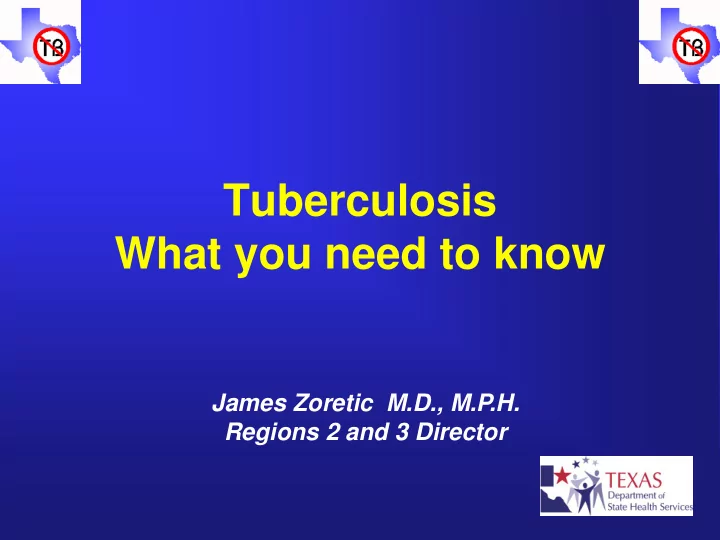

Tuberculosis What you need to know James Zoretic M.D., M.P.H. Regions 2 and 3 Director
What is Tuberculosis? • Tuberculosis, (TB) is a communicable disease caused by the Mycobacterium tuberculosis bacillus • Slow growing germ • Spread by the respiratory route • Persons with contagious TB expel TB germs – usually by coughing but possibly by sneezing, talking or singing
Transmission of Tuberculosis
Transmission of TB • TB germs are in tiny airborne particles called droplet nuclei • If these are inhaled by another person, transmission may occur • Bacilli reach the alveoli of the lung and are ingested by macrophages • When macrophages dies, TB germ may be reingested or spread • Immune system usually responds and control spread of TB germ
Transmission of TB • More likely with more exposure • More likely if more TB bacilli breathed in – from cavitary and smear positive case • More likely with increased time spent – or closer proximity – or being in a more enclosed area with less ventilation
Transmission of TB You cannot get TB from • Clothes • Drinking glass • Eating utensils • Handshake • Toilet • Other surfaces
Symptoms of Active or Suspect case of TB • Persistent cough • Fever, chills, night sweats • Bloody sputum • Chest pain • Loss of appetite • Weight loss • Fatigue
Active or Suspect Case of TB • Usually pulmonary (80%) • Most common extrapulmonary sites – Pleural – Lymphatic – Bone and joint
Latent TB Infection vs Active or Suspect Disease
Latent TB Infection vs Active or Suspect TB disease Active or Suspect TB Latent TB Infection Disease • No signs & symptoms • Signs & symptoms • May or may not have • May or may not have a history of exposure a history of exposure to TB to TB
Latent TB Infection vs Active or Suspect TB disease Active or Suspect TB Latent TB Infection disease • Positive TB Skin or • Positive TB Skin or Blood test Blood test • Normal Chest x-ray • Abnormal Chest x-ray • Not contagious • Can be contagious • One drug treatment • Four drug treatment
Latent TB infection • Latent TB infection (LTBI) • Latent TB have no signs and symptoms • Patients with Latent TB are not contagious • Patients w/ Latent TB do not spread TB to others
Latent TB infection • About 5 to 10% of infected persons who do not receive treatment for latent TB infection will develop TB disease • Generally, persons at high risk for developing TB disease fall into two categories Persons who recently infected with TB bacteria Persons with medical conditions that weaken the immune system
Testing for Tuberculosis
Testing for TB • Two kinds of tests used to detect TB infection • TB skin test (TST) and TB blood tests • Positive TB skin test or TB blood test only tells that a person has been infected • It does not tell whether the person has latent TB infection (LTBI) or has progressed to TB disease
Who needs a TB skin or Blood Test? • Close contacts to active or suspect TB case • Persons whose occupation is in a high risk setting (health care or correctional facility) • All close contacts to active or suspect TB case who test negative on their first skin test must be retested 8-10 weeks later
Testing for TB • Blood test – IGRA • Interferon – Gamma Release Assay • QFT – Quantiferon TB Gold • T- SPOT
Testing for TB • Other tests, such as a chest x-ray and a sample of sputum, are needed to see whether the person has TB disease • If close contacts to active TB cases test negative on first TST or Blood test, they will need a repeat TST or Blood test in 8-10 weeks
What Does a “Positive Skin Test” Mean? • You were exposed to Mycobacterium , which includes Mycobacterium tuberculosis • You had an immune response • Once positive, always positive....get a Chest X- ray, not another skin test
Positive skin or Positive Blood Test Chest X-Ray Negative Abnormal Not Potentially LTBI Infectious Infectious Sputum Sample for AFB and Recommend Culture Preventative Therapy
Testing for TB • Sputum Testing – AFB – Acid Fast Bacillus – Graded as • Negative • <1 • 1+ • 2+ • 3+
Testing for TB • Culture – Positive • Mycobacterium tuberculosis • Gold Standard for confirmation of TB
Public health investigation
Active TB & Suspect Case Workup • Open case record • Obtain Medical History • Obtain Close contact information • Obtain sputums for Acid Fast Bacilli • Obtain sputums for cultures
Active TB & Suspect Case Workup • Exclusion from work/school for 12 or more days • Isolation at home • Case will sign Order to Implement • Started on 4 drug therapy • TB testing of close contacts
Concentric testing • Priority for testing are close contacts of Active TB and suspect cases • Most positive tests will be within Active TB group • Most effective means of conducting the investigation
Reported TB Cases, United States, 1982 – 2009. The resurgence of TB in the mid-1980s was marked by several years of increasing case counts until its peak in 1992. Case counts began decreasing again in 1993, and 2009 marked the seventeenth year of decline in the total number of TB cases reported in the United States since the peak of the resurgence.
Take home messages • Close contacts need to be tested • Latent TB Infection and Active and Suspect TB disease are treatable • Latent TB has one drug treatment • Active TB cases and suspects must comply with treatment • Talk to your physician • Short-term Hotline 817-264-4949
Thank you
Recommend
More recommend